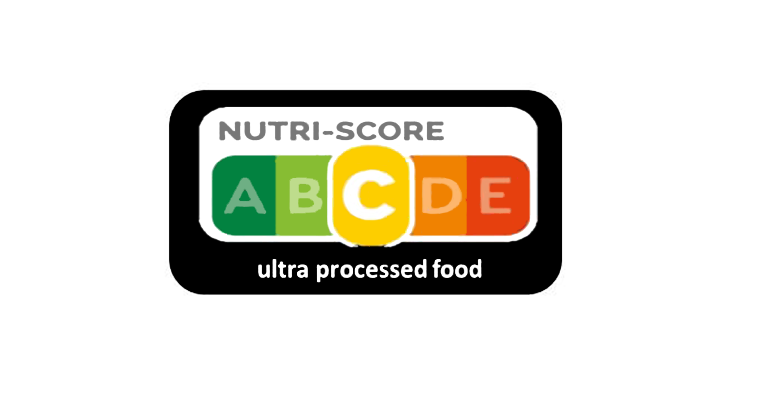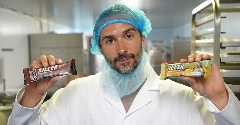News
Nutri-Score 2.0: Is Europe ready for an ‘ultra-processed’ nutrition label?
1 Sep 2023
Scientists have designed Nutri-Score 2.0, a front-of-pack label that also warns consumers if a product is ultra-processed, calling it “a necessary and useful evolution” – and 88% of consumers surveyed want to see it on product packaging.
Colour-coded front-of-pack nutrition labels, such as the Nutri-Score, are efficient tools to help consumers make healthier food purchases by opting for products with a better nutrient profile, according to the nutrition scientists.
However, mounting evidence is linking ultra-processed food consumption to negative health outcomes, independently of their nutrient profile.

For instance, research conducted in 2019 found that a diet made up of ultra-processed foods led to greater calorie intake and more weight gain than a diet of unprocessed foods – even when both diets were matched for calories, sugar, fat, fibre, and macronutrients.
For this reason, scientists decided to design a nutrition label that informs consumers about both nutrient content and the degree of processing – they called this label “Nutri-Score 2.0” – and conduct a study to test its effectiveness.
Led by Serge Hercberg from the University of Sorbonne, Paris and University Paris Cité, who originally developed the Nutri-Score, the team of researchers published their findings in the British Medical Journal.
The updated Nutri-Score 2.0 is composed of the original Nutri-Score encircled by a black band with the word ‘ultra-processed’ on the bottom. (The term ultra-transformé was used in this study, which was carried out in France).
Results: Nutri-Score 2.0 is ‘credible, trustworthy, and easy to understand’
As part of the study to test its usefulness, over 21,000 individuals were randomly shown images of products (cookies, breakfast cereals, and ready-to-eat meals) that had the standard Nutri-Score label; the modified Nutri-Score label with an ultra-processed warning; or no nutritional information in the control group.
Participants then rated their purchase intent and which product they thought to be the healthiest.
The researchers said that Nutri-Score 2.0 increased people’s objective understanding of both the nutrient profile dimension and the ultra-processing dimension, with similar trends seen for the cookies, breakfast cereals, and ready meals.
More than three-quarters of participants in the experiment group said they found the label to be credible, trustworthy, and easy to understand.
Over 84% agreed that it would help them with their purchases; 85.5% said it would give them useful information when food shopping; and 93.9% said it would help them identify ultra-processed foods. Eighty-eight percent said they would like to see this modified Nutri-Score on the front of food packaging.
Nutrient profile and processing degree: Two related but complementary concepts
Hercberg emphasised that this modification adds complementary information to the current NutriScore and does not call into question the way it is calculated.
He told Ingredients Network: “We would therefore like [to see] this development as it completes consumer information by allowing two health dimensions of food products to be taken into consideration: nutritional composition and the fact that a food is ultra-processed. There are still a few practical points to be resolved, but this addition of the black band to the current Nutri-Score seems to us to be a necessary and useful evolution in terms of public health.”
While ultra-processed foods tend to have a poor nutrient profile, the two concepts of processing degree and nutrient content are not collinear, but rather complementary, according to the researchers behind this study.
 © AdobeStock/
© AdobeStock/
A diet soda that contains artificial sweeteners and artificial food colourings, for instance, is considered ultra-processed but it would not necessarily be classified as having a poor nutritional profile since it does not contain nutrients of concern such as sugar or calories (although the Nutri-Score algorithm was recently updated to reduce the prevalence of such products receiving positive A or B scores).
On the other hand, a 100% grape juice is not ultra-processed, but it contains more than 160 g of sugar per litre.
BEUC: A ‘new and interesting’ piece of information for consumers
So, could this modified Nutri-Score help improve European consumers’ eating habits by steering them towards healthier food and drink choices?
Emma Calvert, senior food policy officer at BEUC, the Brussels-based European consumers rights organisation that campaigns for the pan-EU rollout of Nutri-Score, said it had potential but may face opposition.
“Even though most ultra-processed foods already score badly with the Nutri-Score, this new graphic element indicating that a product is ultra-processed could potentially offer a new and interesting piece of information to consumers,” she said.
“Unfortunately, however, this is unlikely to satisfy those who will always be opposed to colour codes even though – or perhaps precisely because – these are clearly the most effective interpretive elements for consumers. There is already a significant body of evidence which shows that the Nutri-Score is liked and understood by consumers and is the best at helping them to opt for healthier food choices in the supermarket.
“The fact that we are still waiting for an EU-wide proposal for a front-of-pack nutrition label nine months past the deadline points more to the heavy lobbying campaign against Nutri-Score than it does to any deficiencies of the label.”
Related news

UK Government overhauls childhood obesity strategy
21 Nov 2025
The UK Government has announced a new package of measures designed to reverse the nation’s childhood obesity epidemic following the release of statistics revealing the scale of the crisis.
Read more
Nitrites: Pressure grows on UK to follow EU’s lead
20 Nov 2025
Pressure is growing on the UK to follow the EU’s lead after the bloc revised its regulations on the permitted levels of nitrites and nitrates in cured meats.
Read more
How younger consumers are redefining ingredient choices and rejecting brand loyalty
18 Nov 2025
Gen Z and millennial consumers’ preferences for transparency, functionality, and purpose are “redefining the very nature of consumption itself”, says SPINS.
Read more
Soy story: WWF scores UK supermarkets on sustainability efforts
12 Nov 2025
WWF has published its latest “Soy Scorecard”, ranking UK supermarkets’ efforts to combat deforestation and land conversion in their soy supply chains.
Read more
New UPF standard hoped to offer consumers ‘coherence and clarity’
10 Nov 2025
Ingredients companies are being urged to enter “a new era of partnership and innovation” following the launch of the industry’s first non-UPF verification scheme.
Read more
Could plant-based protection replace plastic packaging?
29 Oct 2025
Swedish foodtech company Saveggy has launched an additive-free plant-based protection for cucumbers, offering a waste-free packaging solution for fruit and vegetables.
Read more
Does promoting protein content push up plant-based sales?
27 Oct 2025
Promoting the protein content of meat-free products is a more effective sales strategy than adding carbon labels, a study of UK bakery chain Greggs suggests.
Read more
NMN: An on-trend ‘fountain of youth’ ingredient for anti-ageing products
24 Oct 2025
Dubbed an “on-trend fountain of youth ingredient” by Mintel, NMN is booming in anti-ageing ingestible products in Asia – but regulatory roadblocks are thwarting NPD efforts elsewhere, say experts.
Read more
Will Wicks’ Killer Bar harm the protein bar category?
23 Oct 2025
Joe Wicks’ deliberately dangerous protein bar is fuelling anti-UPF sentiment – but there are concerns that his messaging is misguided and could have unintended consequences.
Read more
Amazon Grocery launch aims to balance quality with affordability
22 Oct 2025
Global e-commerce giant Amazon has introduced a new private-label food brand, combining existing Amazon Fresh and Happy Belly products with new everyday items.
Read more